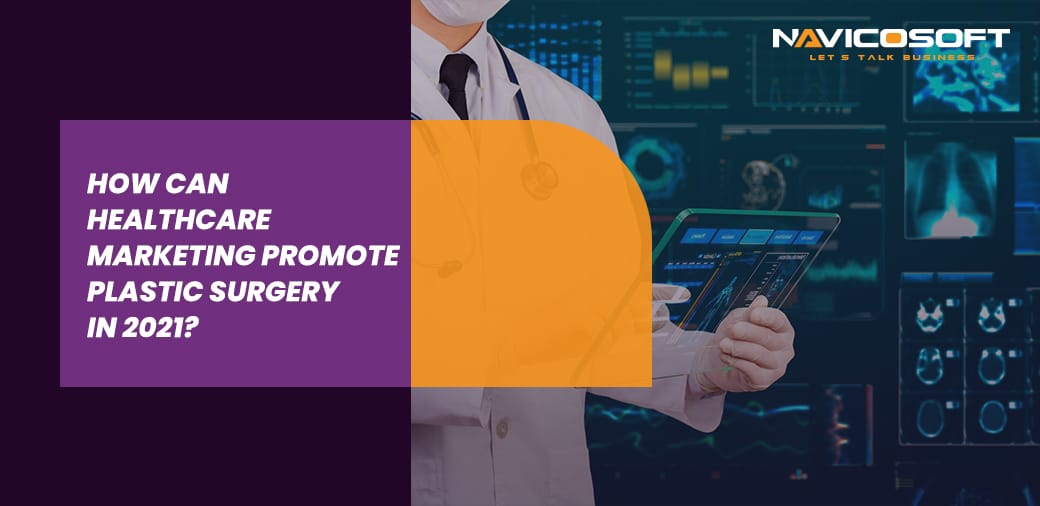How can healthcare marketing promote plastic surgery in 2021?

Plastic and cosmetic surgery, as well as related non-surgical procedures, have never been more popular but healthcare marketing can promote plastic surgery. That’s big plus, but it also means your practice will face stronger competition than ever. So, what are your strategies for dealing with it? Unfortunately, Healthcare strategies that worked in the past may no longer be sufficient – or even appropriate – in attracting new patients to your plastic surgery practice.

Prospective patients – women and men of all ages – are considering cosmetic improvement therapies or plastic surgery for various reasons. Will they opt for your practice? If you reach out to them in the correct ways, they will respond. A well-thought-out strategy may raise brand awareness, demonstrate your reputation and experience, and clearly distinguish you from the competition. Successful marketing nowadays necessitates a clever plan, which is possible with digital healthcare marketing.
You realize the value of information and practiced expertise as a medical practitioner when it comes to achieving the best results. As a response, you owe it to yourself and your potential customers to improve your marketing plan.
Plastic Surgery Marketing in 2021
According to the World Health Organization, the COVID-19 outbreak has achieved pandemic proportions, with about 14 million confirmed infections and nearly 600,000 linked fatalities worldwide as of July 2020.
Social isolation is one of the various tactics used to slow the development of the disease. Although determining actions for non-essential/urgent problems (e.g., canceling entertainment-related social occasions) is simple, it is more difficult to put into practice when human contact is required (e.g., hospitals and supermarkets).
In order to address this issue, many hospitals have canceled low-priority treatments and recommended departments to shift outpatient consultations to telehealth or digital/virtual means.
Covid-19 change the healthcare industry
With the spread of Coronavirus, in 2021 the healthcare industry saw numerous changes, one of which was a rise in demand for telemedicine. Telemedicine is commonly employed in areas such as general practice, allowing patients to consult with a nurse or doctor over the phone without having to visit a clinician in person. With the possibility of Coronavirus transmission, particularly in healthcare facilities, many people have chosen digital consultations. Despite the fact that telemedicine has been around for a long time, it took a pandemic to move the attention away from physical consultations and toward virtual ones. To be sure, telemedicine or telehealth refers to the provision of healthcare consultation services through online consultations.
Online consultation is a form of digital medical treatment that avoids the drawbacks of traditional medical care and gives patients a more convenient and economical option. It also minimizes the risk of spreading infectious diseases by limiting the number of patients admitted to hospitals.
Digital healthcare in plastic surgery
According to studies on digital healthcare in plastic surgery as a tool for specialist consultations, the benefits include more rapid access to appointments/professional opinions and avoiding travel to face-to-face appointments.

In addition, the use of video consultation for the follow-up of plastic and cosmetic surgery has been investigated by several doctors. When compared to face-to-face consultations, they report similar patient satisfaction and perceived quality of care.
IN 2021, HOW CAN YOU DO HEALTHCARE MARKETING FOR PLASTIC SURGERY?
To help you answer that vital question, we’ve put together a multi-point guide that will lead you through the essential components of your marketing strategy.
- Practicing brand – Your label is welcoming, approachable, and high-end.
- Website – Most crucial marketing tool you have is your website.
- Landing pages – these are the pages where visitors become leads and leads become patients.
- Blogging – Continual patient education is essential for keeping prospective and current patients up to date on the latest trends and practices.
- Social media – Using social media to meet your prospects where they spend their time.
- Email marketing – Lead nurturing that works with email marketing.
- Online advertising – Taking all of the other digital features and supercharging them with online advertising.
- Patient testimonials – Share your prospects’ achievements as well as patient testimonials.
- Loyalty programs – A Path to Consistent Revenue
- Budget planning – How can you get the most value for the money when it comes to budgeting?
The impact of healthcare marketing in plastic surgery
Plastic surgeons from across the country use digital healthcare marketing to care for their patients during the current global COVID-19 outbreak.
Few plastic surgeons offered video conferencing to patients before the epidemic.
Long-term, it’s realistic to expect the digital healthcare market’s favorable impact on plastic surgery to continue.
Furthermore, ensuring that patients have affordable access to effective professional treatment can improve patient satisfaction.
Indeed, studies have shown that using digitalization healthcare technologies in plastic surgery to treat patients is equally as effective as seeing them in person when it comes to recognizing problems and managing post-operative wound healing difficulties.
Choosing the Right Healthcare Marketing Company for Your Plastic Surgery Practice
In many markets, aesthetic healthcare providers face stiff competition. As a result, plastic and cosmetic surgery practices may believe that their ability to promote their services effectively is just as important as their talents. This is one reason why choosing one or more agencies to help you create and execute your marketing strategy is crucial. Let’s take a glance at a few of the more systematic ways.
Plastic surgery practices frequently seek out healthcare agencies who specialize in one or two sorts of marketing methods and entrust their practice’s growth to them. There are some of the most frequent marketing strategies used by some companies:
SEO
You might be drawn to a company specializing in search engine optimization if one of your primary goals is to appear on the top page of Google search results. There is certainly no shortage of these providers, but the truth is that achieving first-page search results requires a lot of work and a lot of high-quality, interesting content. Therefore, in addition to SEO, you should pursue a variety of other methods for attracting visitors to your website.
Social Media
While using social media to promote and advertise is an important aspect of any beauty marketing strategy and it will be ineffective if done alone. It should be part of a bigger plan that includes web content, landing sites, and downloadable tools to produce qualified leads. Hiring an expert to handle social media may appear to save your time. The truth is that it will not achieve the results you desire unless the social media material is part of a more comprehensive strategy that is shared across all of your marketing operations. The time and effort required to arrange that integration outweigh any time saved by outsourcing your social media content to a professional.
Email Marketing
Email marketing companies, like social media marketing vendors, will claim to deliver qualified leads while also nurturing your customers. They may be able to create appealing layouts with intriguing graphics, compelling subject lines, and content, but they don’t know your client as much as you do. They will realize that the patient has called to book a consultation, so they’ll keep sending her messages asking her to repeat what he’s already done. Email marketing efforts should be regularly managed by a team that knows where things stand with your prospects, leads, and patients to ensure that the information intended to create a relationship and build trust does not wind up making you appear chaotic.
Website Design
For every plastic surgery practice, having a unique website is a must. Your practice website should serve as your virtual front door, with information about the products and services you provide, a blog, and, of course, a before and after gallery. While having an appealing layout with interesting visuals, brilliant colors, and captivating information is crucial, ensuring that every piece is tightly linked with the requirements and expectations of your target patients is far more essential. That goal necessitates far more knowledge than you’ll find in any specialized web design agency.
Which Healthcare Marketing Agency is best for Your Plastic Surgery Practice?
With so many options, identifying potential marketing partners may be challenging and time-consuming. It’s critical to choose an agency with a track record of working with plastic and cosmetic surgery focused healthcare practitioners. In addition, it’s vital to find a staff that fits in with your practice’s culture. While any alliance takes time to form, starting with an experienced team who has worked with similar customers before is a wonderful place to begin.
If you want it done right, hire a marketing agency that uses a comprehensive marketing platform like NavicoSoft, which integrates your website, email, social media, digital advertising, and keyword optimization, and assigns you a dedicated team who will keep an eye on your campaigns in real-time. They have the knowledge and experience to create and execute your marketing strategy while consistently delivering excellent results. NavicoSoft has aided plastic and cosmetic surgery practices, laparoscopic surgery practices, weight loss surgery practices and other healthcare providers for several years. They have opted to capitalize on their success by serving this sector because they have achieved outstanding outcomes for clients in this field.













